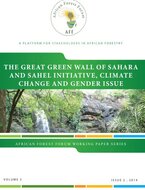African countries have been facing several environmental challenges related to climate change and desertification. To cope with these challenges, several efforts have been made by individual countries to implement projects and programmes related to desertification control, management of natural resources and to the improvement of living conditions and incomes of people, particularly in rural areas. At technical and institutional levels, policies and strategies have been developed by African countries to strengthen their commitment to implementing regional and global initiatives, such as the three United Nations Conventions on Biological Diversity, Climate Change, and on Combating Desertification. But it has
recently been realised that these individual efforts have great limitations as challenges often go beyond national borders.
In this regard, CEN-SAD (Community of Sahel and Sahara States) Leaders and Heads of States adopted in June 2005 in Ouagadougou (Burkina Faso) the Great Green Wall Initiative as an afforestation programme to respond to the combined effects of natural environmental degradation, droughts and desert encroachment. The concept evolved to an integrated rural development programme that addresses combating desertification, land degradation and deforestation, and improving the livelihoods of local people.
The initiative has later been endorsed by the African Union as a Pan-African initiative with an agency created in 2010 by 11 Sahelian desert frontline countries to oversee the implementation of the initiative in the participating countries. Some of these countries, with the support of international and regional institutions, have developed and adopted their national strategies and plans for the implementation the initiative and established their national agencies. The Pan-African Agency of the Great Green Wall for the Sahara and Sahel Initiative (PA/GGWSSI) developed a consolidated action plan of implementation based on national documents. Most of these (strategies and actions plans of implementation) were developed based on agreed pillars of interventions with the aims of containing natural resources degradation, including forest and tree resources, and improving the social and economic welfare of communities. Also cross-cutting issues, such as gender and vulnerable groups, are considered. National strategies and international conventions and policies were also considered in order to align the initiative to national and international environmental agreements.
The implementation stage of the action plans differs from one country to another based on the level of financial resources mobilisation. The Great Green Wall of Sahara and Sahel Initiative: climate change and gender issues © African Forest Forum (August 2014)
All stakeholders supporting this process at national and regional levels have been acknowledged with recommendations to improve the way they support the initiative. The African Forest Forum, being a strong platform for African forestry, should play a key role in assisting both individual countries and the Pan-African Agency with technical, political and advocacy support.

